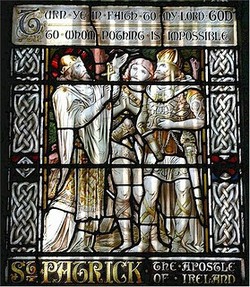 On the northern coast of Ireland, a whole community of newly baptized Christians were just waking up. It was a new day in a new faith and the future felt pure and good.
On the northern coast of Ireland, a whole community of newly baptized Christians were just waking up. It was a new day in a new faith and the future felt pure and good.
It was going to be anything but.
Patrick was no longer there. In his relentless march, back and forth across Ireland, he had already moved on. He had very much been in evidence yesterday though. Those converting to Christianity had donned white robes; and lined up to speak the words and receive oil on their foreheads. All were anointed under Patrick.
Lost in the memory and trusting in the new God, the community did not see the forces of Coroticus coming. The violence was immense. The armies wore the iron, and bore the training, of Rome. They cut through the Irish settlement like it was nothing. Bodies lay strewn across the ground. Homes were looted for Celtic gold. Slaves were taken.
Someone, at least, must have escaped. Someone raced down the road after the huge pedestrian train of St Patrick and his followers. Someone found and told them.
It was a slap in the face to Patrick personally. Coroticus was Romano-British and he was a Christian. Yet he'd taken Patrick's Irish converts as slaves. Coroticus had killed his brethren of the faith; and taken more as slaves. Slaves!
The teenager inside the man must have shivered. The incomprehensible had happened again. Once Patrick had been taken in exactly the same way, but by Irish Pagans from a Christian British villa. He could picture it all too well. He had lived it.
Only this time the disrespect hit in a different way. It undermined his mission. It sent a loud, wide message to the Irish that the Christian God could not protect them. Things like this did not happen when Morrighan had Her due.
Patrick remained calm, though his blood was boiling. He turned to one of his young priests. The man had been a boy when Patrick baptized him. He was now in his early 20s, having spent his whole life hearing Patrick's teaching. He was the man who was dispatched back to the settlement to deal with Coroticus.
"Just tell him that they're Christians." Patrick advised. "He probably doesn't know that I baptized them. it was only yesterday."
The young man left, taking a handful of fellow priests with him. They witnessed first-hand the carnage and corpses; and they caught up with the raiders at the shoreline. The Irish captives were there, some sobbing, some furious, some numb with shock, all terrified and in chains.
Patrick's priests sought out Coroticus himself and explained the situation. He laughed in their faces. Patrick's mission was a joke! The Irish were scum, subhuman, without souls. Converting them to Christianity made a mockery of Christ Himself! Plus they'd fetch a good price amongst the Pagan Scotti and Picti tribes.
There was little that the priests could do. They watched the slaves leaving with a sense of utter futility. Then they reported back to Patrick; and he raised Holy Hell.



 On the northern coast of Ireland, a whole community of newly baptized Christians were just waking up. It was a new day in a new faith and the future felt pure and good.
On the northern coast of Ireland, a whole community of newly baptized Christians were just waking up. It was a new day in a new faith and the future felt pure and good. 
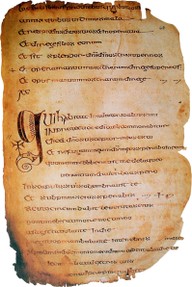 It's said that the pen is mightier than the sword. Steeped in the Irish culture and traditions now, St Patrick had certainly seen the bards at work. He knew the importance of words.
It's said that the pen is mightier than the sword. Steeped in the Irish culture and traditions now, St Patrick had certainly seen the bards at work. He knew the importance of words. 



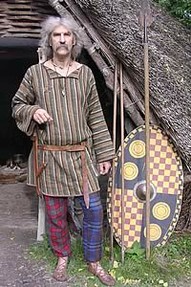 The letter was carried and read across the entire Roman Empire. It couldn't have come at a worse time for Britain, nor its embarrassed Romano-British nobility.
The letter was carried and read across the entire Roman Empire. It couldn't have come at a worse time for Britain, nor its embarrassed Romano-British nobility.



 Are we sure that we can trust the word of Bishop Padraig on the subject of Coroticus? The conduct of a good Roman man and a Christian soldier, as told by someone trying to covert the barbarian Irish?
Are we sure that we can trust the word of Bishop Padraig on the subject of Coroticus? The conduct of a good Roman man and a Christian soldier, as told by someone trying to covert the barbarian Irish?


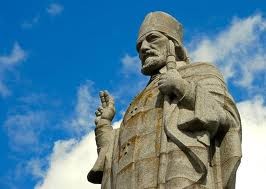 Patrick could sense all of his hard work being eroded away.
Patrick could sense all of his hard work being eroded away. 





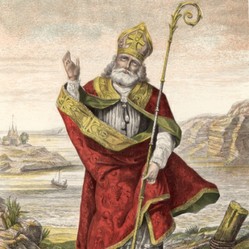

 St Tydecho's Churches in West Waleson 09/03/2014
St Tydecho's Churches in West Waleson 09/03/2014
 Goodies for an Outlander Premiere Partyon 03/06/2015
Goodies for an Outlander Premiere Partyon 03/06/2015
 Holocaust Memorial Day Interview with Rainer Höss, Grandson of Rudolf Architect of Auschwitzon 01/24/2015
Holocaust Memorial Day Interview with Rainer Höss, Grandson of Rudolf Architect of Auschwitzon 01/24/2015
 Romantic Valentine Gifts for an Outlander Fanon 01/16/2015
Romantic Valentine Gifts for an Outlander Fanon 01/16/2015

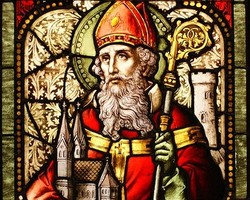
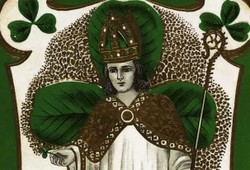
Comments
I'm glad that I was able to inform you. I found it an interesting story as I was researching it too. So much that we don't know, when we're drinking our way through March 17th.
Thank you for reading my other articles too.
Thank you for this series. As a British born child of Irish parents we always celebrated St Patrick's Day at our school, but I never really learned much detail about his life.
I do enjoy reading your articles, particularly the Runescape and Pagan topic ones.
Thank you for reading them, and I'm pleased that you found them interesting. :)
These were very interesting. Now I know a lot more about st. Patrick.:)
Glad to hear it. :) Thank you for reading.
thank you, iv'ed enjoyed reading these.
You get the contract and I'll sign on the dotted line. :D
I'm glad that you liked it. Thanks for reading.
This is a lovely series, Jo! It should be adapted for TV. :)
You're very welcome. Thanks for reading it!
Great story, Jo! Thank you so much for sharing it!